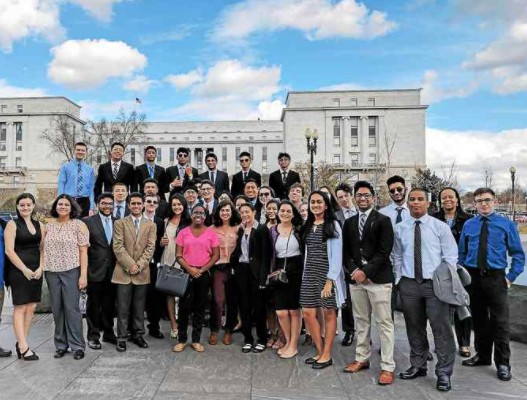Sign up for The Media Today, CJR’s daily newsletter.
Investigative reporters preach the gospel of the Freedom of Information Act. But too often, documents obtained through FOIA are redacted beyond practical use.
Stuart Wexler, a high school civics and government teacher from Hightstown, New Jersey, knows this struggle well. In 2015, while working on a book about religious terrorism, he filed several FOIA requests for documents that, Wexler tells CJR, would show how radical Christianity was connected to past racist crimes and white supremacy. The impossibility of obtaining full access to such records started him on a quest: designing a legislative fix that would fill the gaps left by FOIA law.
In particular, Wexler was chasing down a lead on Henry Alexander, a Ku Klux Klan member from Alabama who had been involved in the 1957 death of Willie Edwards, a black, 23-year old truck driver who had been forced to jump to his death by Alexander and Klan members near Montgomery. Before Alexander died, he confessed to his wife—whom Wexler has interviewed—and there was talk that his role as an alleged FBI informant may have helped shield him from prosecution. Wexler filed a request with the FBI for documents related to a 1993 probe on the matter spearheaded by former director Louis Freeh.
“I got everything but the Freeh-mandated investigation. I got nothing on their internal investigation into Henry Alexander,” says Wexler. He’d run into the problem before, so much so that multiple chapters in his book include a disclosure about how the government’s refusal to release documents had caused a new line of inquiry to fizzle and die.
“[This happens] time and time again, and I am by no means the only person who has these problems,” says Wexler, and reporters are among the most familiar with the frustration. “I’m getting denied in full. Plenty of people get materials but the redactions are so pronounced there’s no way you can make heads or tails of it.”
Frustrated, Wexler decided to ask his high school students to give it a try. They worked in pairs to write and submit FOIA requests to the FBI.
“The vast majority [of students] either didn’t receive a response at all, or didn’t for a very long time,” says Abigail Nickerson, 19, who was in Wexler’s class at the time. Now a sophomore at Vanderbilt University, Nickerson says the experience gave the students proof of a problem. “[It showed us] how reluctant the government seemedto be in providing these files. Whether that was because of the complications in the system or administrative procedure, that got us going.”
Wexler’s students worked that year to write the Cold Case Records Collection Act, a bill that, if passed, could fill the holes left by the existing FOIA law—such as long wait times and agencies’ ability to redact large parts of documents. It would establish an independent review board to make decisions about the release of unredacted FBI and other government records on Civil Rights–era crimes, including those that remain unsolved. The class modeled its bill primarily after the John F. Kennedy Records Collection Act of 1992, which mandated that all assassination records be stored by the National Archives and Records Administration, and the Emmett Till Unsolved Civil Rights Crime Act of 2007, which established unsolved Civil Rights crimes divisions at both the FBI and the Department of Justice (the latter was reauthorized in 2016).
Wexler’s students worked to write the Cold Case Records Collection Act, a bill that, if passed, could fill the holes left by the existing FOIA law.
Since then, three generations of students in Wexler’s AP US government class have worked to write, lobby, and secure Congressional support for the bill. In 2017, the bill was introduced in the House by Illinois Representative Bobby Rush. Wexler says it has attracted support from the likes of Bill Baxley—the former attorney general from Alabama who famously told a KKK grand dragon to “kiss my ass” after the organization threatened him for reopening the 16th Street Baptist Church bombing case in the early 1970s. The bill also has support from Bobby DeLaughter, the Mississippi prosecutor who convicted Medgar Evers’s killer, and Democratic Senator Doug Jones, who beat Roy Moore in Alabama’s special election last year. (Jones prosecuted Thomas Blanton, Jr. and Bobby Frank Cherry for the 16th Street bombing in 2001 and 2002, respectively.) The Southern Poverty Law Center, the New Jersey chapter of the NAACP and the Emmett Till Justice Project also support the bill, according to Wexler.
For Stanley Nelson, a reporter at the Concordia Sentinel in Ferriday, Louisiana, the bill could prove instrumental. Nelson started reporting on cold cases from the Civil Rights–era in 2007, when the FBI reopened dozens of previously unsolved cases, including that of Frank Morris. Morris, a black shoe-shop owner with a racially diverse clientele in Ferriday, was murdered in 1964 after white men doused the store—and Morris—in gasoline and set it on fire.
Nelson got his hands on 150 pages of redacted records, supplied to him by the SPLC, that allowed him to write the first story in 2007. Soon after, he joined the Center for Investigative Reporting’s Civil Rights Cold Case Project, a coalition of investigative reporters working on projects related to unsolved cases. The Morris case and many of the more than 200 cold-case articles he’s written since have been significantly delayed because of the time it takes to decipher intensely redacted files. For cases that are decades old, this can come with devastating consequences.
“One suspect from the 1960s died six months after the Morris case was reopened in 2007,” says Nelson. “Had I been able to get my hands on the file, I would have went and talked to him. I never knew who he was [because his name was removed from documents]. The more time that passes, witnesses and suspects are dying. If you can get that document with names, your work has been jump started.”

Stuart Wexler’s AP US Government class.
Nelson, who is a vocal supporter the Cold Case Records Collection Act, says journalists play an important role in unearthing the full truth of this painful era in American history that could help readers understand the history behind law enforcement’s fragile relationship with communities of color.
“We cannot begin to address those things honestly until we truly know what happened in our communities. We have to know the truth. Our ability to get to the truth is slowly dying because witnesses and suspects are dying,” says Nelson. “The documents, for journalists, are the pathway to finding the truth so it isn’t hidden in some FBI vault.”
Nelson keeps a folder of the obituaries of witnesses and suspects involved in cold cases he is investigating. It’s now an inch and a half thick. The Cold Case Records Collection bill, he says, would make his work much faster, enabling him to reach people before they die, taking the truth with them. “I think we’ll be amazed at what we see. The bill is a great idea and is exactly what we need,” he says.
With the help of the Morris documents, Nelson was able to investigate the cold case over 29 months, generating 122 stories on the murder. Giving reporters more efficient access to these kinds of documents could speed up the work of people like Nelson. Nelson was able to disprove a longstanding town rumor in Ferriday that said the violent act against Morris had stemmed from his facilitation of sexual encounters between black men and white women, a familiar excuse for racist violence in the South. It was a lie, spread by the KKK after his death in an attempt to diminish his reputation in the town. More of this kind of corrective work could be done—and much faster—if reporters like Nelson had easier access to cold-case documents.
“The rumor about Morris was that he was involved in these illicit activities at night. [In fact], he was killed because he had gotten into an argument with a Concordia Parish deputy over [services rendered to his] cowboy boots, and [the deputy] not wanting to pay his bill,” says Nelson. “The deputy was going to teach him a lesson and it happened that Frank was in the shop in the middle of the night when they came. It had nothing to do with Frank being an immoral man. That’s truth.”
Nelson heard from the granddaughter of Morris, who had seen his initial story. She told him that she’d learned more about what happened to her grandfather in his story than she’d ever known before.
For Wexler’s students, the Cold Case Records Collection Act is about more than an attempt to reveal the difficulties of the FOIA process and to push the government to live up to its ideals about transparency. It’s about closure for families and about correcting the historical record on an area—race—that we as a country, including the media, have handled miserably.
“The idea that hopefully we could get some of these cases solved, especially for families that are still living without knowing what happened is the first primary goal,” says Nickerson, the student from Wexler’s original class. “In all the ways our political system seems broken, to show that even a group of high schoolers without a lot of experience can call and email our representatives and get a bill introduced addressing an issue that we think is important shows that in some ways, our government is still capable of working in the ways it’s supposed to. I think it’d be important to show people my age that changes can actually be made.”
ICYMI: One legal case could open a can of worms for defamation suits against writers
Has America ever needed a media defender more than now? Help us by joining CJR today.



